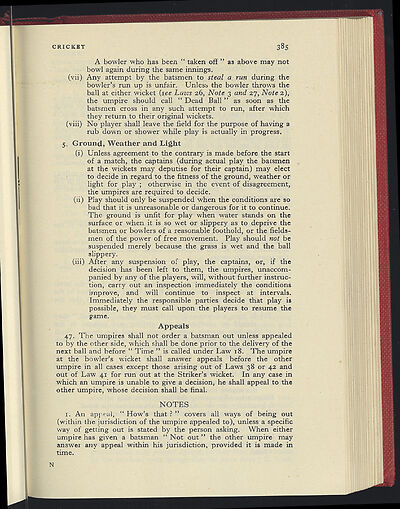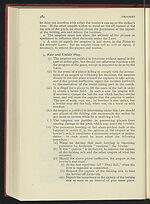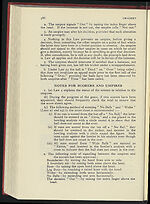1957-58
(403)
Download files
Complete book:
Individual page:
Thumbnail gallery: Grid view | List view

I
CRICKET
N
3
8
5
A bowler who has been " taken off " as above may not
bowl again during the same innings.
(vii) Any attempt by the batsmen to
steal a run
during the
bowler's run up is unfair. Unless the bowler throws the
ball at either. wicket
(see Laws
26,
Note 3 and
2'7,
Note
2),
the umpire should call "Dead Ball" as soon as the
batsmen cross in any such attempt to run, after which
they return to their original wickets.
(viii) No player shall leave the field for the purpose of having a
rub down or shower while play is actually in progress.
5. Ground, Weather and Light
(i) Unless agreement to the contrary is made before the start
of a match, the captains (during actual play the batsmen
at the wickets may deputise for their captain) may elect
to decide in regard to the fitness of the ground, weather or
light for play ; otherwise in the event of disagreement,
the umpires are required to decide.
(ii) Play should only be suspended when the conditions are so
bad that it is unreasonable or dangerous for it to continue.
The ground is unfit for play when water stands on the
surface or when it is so wet or slippery as to deprive the
batsmen or bowlers of a reasonable foothold, or the fields-
men of the power of free movement. Play should
not
be
suspended merely because the grass is wet and the ball
slippery.
(iii) After any suspension o: play, the captains, or, if the
decision has been left to them, the umpires, unaccom-
panied by any of the players, will, without further instruc-
tion, carry out an inspection immediately the conditions
improve, and will continue to inspect at intervals.
Immediately the responsible parties decide that play is
possible, they must call upon the players to resume the
game.
Appeals
4'7. The umpires shall not order a batsman out unless appealed
to by the other side, which shall be done prior to the delivery of the
next ball and before " Time " is called under Law
18.
The umpire
at the bowler's wicket shall answer appeals before the other
umpire in all cases except those arising out of Laws
38
or
42
and
out of Law
41
for run out at the Striker's wicket. In any case in
which an umpire is unable to give a decision, he shall appeal to the
other umpire, whose decision shall be final.
NOTES
I.
An appeal, "How's that ? " covers all ways of being out
(within the jurisdiction of the umpire appealed to), unless a specific
way of getting out is stated by the person asking. When either
umpire has given a batsman " Not out " the other umpire may
answer any appeal within his jurisdiction, provided it is made in
time.
r
s
CRICKET
N
3
8
5
A bowler who has been " taken off " as above may not
bowl again during the same innings.
(vii) Any attempt by the batsmen to
steal a run
during the
bowler's run up is unfair. Unless the bowler throws the
ball at either. wicket
(see Laws
26,
Note 3 and
2'7,
Note
2),
the umpire should call "Dead Ball" as soon as the
batsmen cross in any such attempt to run, after which
they return to their original wickets.
(viii) No player shall leave the field for the purpose of having a
rub down or shower while play is actually in progress.
5. Ground, Weather and Light
(i) Unless agreement to the contrary is made before the start
of a match, the captains (during actual play the batsmen
at the wickets may deputise for their captain) may elect
to decide in regard to the fitness of the ground, weather or
light for play ; otherwise in the event of disagreement,
the umpires are required to decide.
(ii) Play should only be suspended when the conditions are so
bad that it is unreasonable or dangerous for it to continue.
The ground is unfit for play when water stands on the
surface or when it is so wet or slippery as to deprive the
batsmen or bowlers of a reasonable foothold, or the fields-
men of the power of free movement. Play should
not
be
suspended merely because the grass is wet and the ball
slippery.
(iii) After any suspension o: play, the captains, or, if the
decision has been left to them, the umpires, unaccom-
panied by any of the players, will, without further instruc-
tion, carry out an inspection immediately the conditions
improve, and will continue to inspect at intervals.
Immediately the responsible parties decide that play is
possible, they must call upon the players to resume the
game.
Appeals
4'7. The umpires shall not order a batsman out unless appealed
to by the other side, which shall be done prior to the delivery of the
next ball and before " Time " is called under Law
18.
The umpire
at the bowler's wicket shall answer appeals before the other
umpire in all cases except those arising out of Laws
38
or
42
and
out of Law
41
for run out at the Striker's wicket. In any case in
which an umpire is unable to give a decision, he shall appeal to the
other umpire, whose decision shall be final.
NOTES
I.
An appeal, "How's that ? " covers all ways of being out
(within the jurisdiction of the umpire appealed to), unless a specific
way of getting out is stated by the person asking. When either
umpire has given a batsman " Not out " the other umpire may
answer any appeal within his jurisdiction, provided it is made in
time.
r
s
Set display mode to:
![]() Universal Viewer |
Universal Viewer | ![]() Mirador |
Large image | Transcription
Mirador |
Large image | Transcription
| Games and sports in the army > 1957-58 > (403) |
|---|
| Permanent URL | https://digital.nls.uk/248856236 |
|---|
| Description | 'Games and Sports in the Army' was an annual publication produced by the British War Office between the 1930s and 1960s. This included the Second World War. It outlines the rules and regulations for games and sports played by members of the armed forces. It features names and photographs of team members, and examples of contemporary advertising. |
|---|---|
| Shelfmark | GWB.52 |

